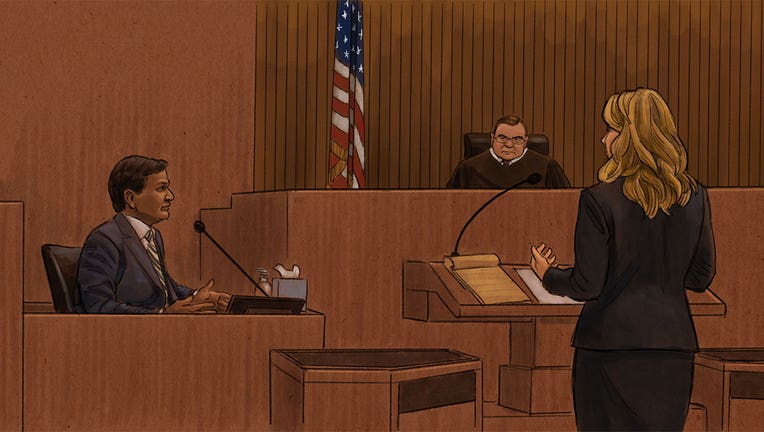MPD federal trial: Another medical expert says officers could have saved George Floyd

Dr. Vic Bebarta gives testimony in federal court. (Cedric Hohnstadt Illustration)
ST. PAUL, Minn. (FOX 9) - Federal prosecutors called another expert medical witness to the stand Wednesday in the civil rights trial of former Minneapolis Police officers Tou Thao, J. Alexander Kueng, and Thomas Lane.
Dr. Vik Bebarta testified that George Floyd died because a lack of oxygen to his brain caused his heart and lungs to stop. And he said the reason for that is because of the pressure to his neck and back that fatally restricted his breathing.

MPD federal trial: Another medical expert says officers could have saved George Floyd
Federal prosecutors called another expert medical witness to the stand Wednesday in the civil rights trial of former Minneapolis Police officers Tou Thao, J. Alexander Kueng, and Thomas Lane.
All three officers are charged with failing to provide medical aid to George Floyd on May 25th of 2020, as Floyd was held prone to the pavement at 38th and Chicago. Thao and Kueng are also charged with failure to intervene in Derek Chauvin’s use of force, which was pressing his knee down on Floyd’s neck.
Thomas Lane is not charged with the failure to intervene charge in part because he suggested twice to Chauvin that stop holding Floyd down and roll him onto his side. Chauvin said no.
Dr. Bebarta, a professor at the University of Colorado, specializes in emergency medicine and medical toxicology, and pharmacy. He testified that the drugs found in Floyd’s system, methamphetamine and fentanyl, were in far too small amounts to cause his death. "He did not die of an overdose," he said.
He also testified that Floyd did not suffer a heart attack, which is a sudden condition caused by clogged arteries. The cause of Floyd’s cardiac arrest, Dr. Bebarta testified, was the lack of oxygen and build-up of carbon dioxide caused by the police restraint.
Asked if Floyd would have lived had he been repositioned to breathe better before he lost consciousness, Dr. Bebarta had no doubt. "He would have lived."
He also testified that if CPR had begun right after Floyd lost consciousness, his chances would have been very high.
"Was this a survivable incident for Mr. Floyd? Yes. Who had the best chance of resuscitating Mr. Floyd and saving his life? The officers who were over him at the time."
Dr. Bebarta also testified that Floyd showed none of the ten symptoms associated the Excited Delirium, a controversial term used to describe people in a highly agitated state after drug use.
As cross-exam began mid-Wednesday, defense attorney Robert Paule focused on excited delirium, which has come up repeatedly with other witnesses. While the American Medical Association and other medical groups do not recognize Excited Delirium, Paule introduced evidence that the American College of Emergency Physicians does: a White Paper published in 2009. Dr. Bebarta is a member of ACEP, but played no role in the paper.
Defense attorneys have given Excited Delirium a lot of attention throughout the trial, including extensively going over how officers were trained to respond to it. Defense attorneys appear to be building a case that the officers responded the way they did because they suspected Floyd to be in this state, based on their training, which the defense says was faulty.

